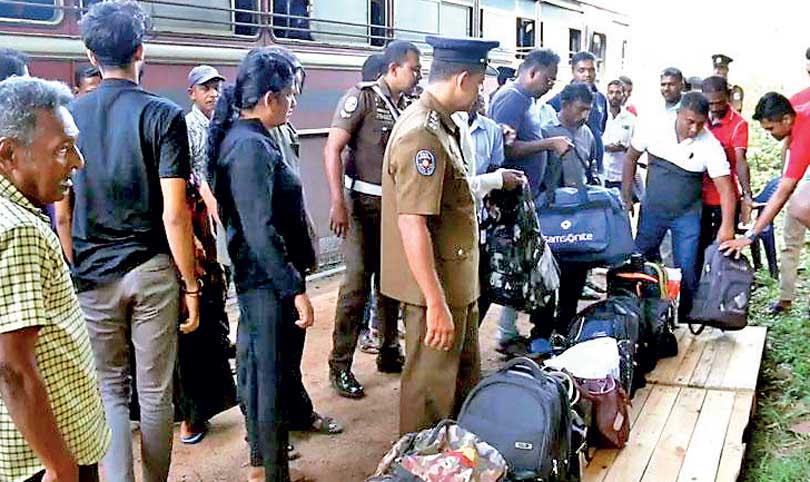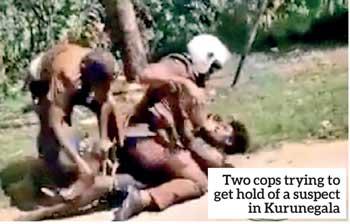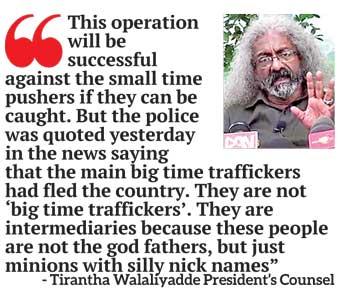09 Jan 2024 - {{hitsCtrl.values.hits}}

Police officers checking bags of passengers travelling in long distance buses.
Pic by Pushpakumara Mallawarachchi
 Law enforcement authorities have been able to net over 29,000 suspects during the past 22 days under its recently launched ‘Yukthiya’ anti-drug operation. The main objective of this operation is to wipe drugs off the street and to establish a safer society for future generations. Even though the public has extended their support to the police and security forces, incidents of public strip searches and warrantless arrests too had been reported. Amongst the arrestees are some 1600 suspects who have been sent to rehabilitation centres. But the legal procedure to send suspects to rehabilitation centres isn’t clear.
Law enforcement authorities have been able to net over 29,000 suspects during the past 22 days under its recently launched ‘Yukthiya’ anti-drug operation. The main objective of this operation is to wipe drugs off the street and to establish a safer society for future generations. Even though the public has extended their support to the police and security forces, incidents of public strip searches and warrantless arrests too had been reported. Amongst the arrestees are some 1600 suspects who have been sent to rehabilitation centres. But the legal procedure to send suspects to rehabilitation centres isn’t clear.
‘The remedy to bust the drug menace is with the President himself’: Walaliyadde
In this backdrop President’s Counsel Tirantha Walaliyadde, who has been vocal on various issues with regard to the law and order in the country, responded to some salient questions with regards to the ongoing anti-drug operation.
Excerpts:
 Q: Many individuals, allegedly suspected as drug addicts, are being arrested and forcibly taken into custody under the Yukthiya operation. News reports state that some are being sent to rehabilitation centres. What is the legal procedure behind sending a suspect to a rehab centre?
Q: Many individuals, allegedly suspected as drug addicts, are being arrested and forcibly taken into custody under the Yukthiya operation. News reports state that some are being sent to rehabilitation centres. What is the legal procedure behind sending a suspect to a rehab centre?
Thousands of alleged drug addicts are being taken into custody during the Yukthiya operation. And according to news doing the rounds, they are being sent to rehab camps. There are medical centres at these rehab camps and maybe after they are sent there the relevant examinations are done, and if the results are negative, they are released. Considering the magnitude of the operation it would be practically impossible to file cases against each and every suspect. A court case involves a B report in duplicate, filing, and taking the suspects to court under guard, and police representation. The courts would have little time for the other matters that are pending.
Q: We recently witnessed an incident in Kurunegala where police officers were seen tying the legs of a suspect in order to take him for questioning. Some made links between this incident and the George Floyd case. Can the cops behave in such a manner; even during a tense situation?
 It is not quite easy to apprehend a drug addict if he knows what’s happening. One must remember that many of these addicts are armed with weapons. So, in these instances each case must be considered on its own merits before making strictures against the police who are risking their lives every day.
It is not quite easy to apprehend a drug addict if he knows what’s happening. One must remember that many of these addicts are armed with weapons. So, in these instances each case must be considered on its own merits before making strictures against the police who are risking their lives every day.
Q: There are many incidents of harassment and bullying by the cops. One report indicated how the cops forced a young boy to strip his pants and underwear as they found a pair of scissors in his wallet and had suspected that he is carrying them for some drug-related purpose. What are your observations in this regard?
In relation to harassment, I saw the statement issued to the internet by the father of the victim. If the statement is true then there has been a violation of the victim’s fundamental rights as well as the girl’s.
It is good that this type of situation is brought to public notice, and stern and swift action should be taken against the officers responsible in terms of the constitution and the penal code. Mere disciplinary action would be quite inadequate.
Q: Other than the Constitution what are the other laws that protect the rights of citizens in a situation like this?
The Constitution grants a civil remedy to the victim whilst the penal code provides criminal action.
Q: Do you think the masterminds behind the drug menace would be prosecuted under this operation?
This operation will be successful against the small time pushers if they can be caught. But the police was quoted yesterday in the news saying that the main big time traffickers had fled the country. They are not ‘big time traffickers’. They are intermediaries because these people are not the god fathers, but just minions with silly nick names.
The main handlers in Sri Lanka haven’t even been touched so far. Tell the Yukthiya to summon Maithripala Sirisena for a statement and demand that he justifies his allegations made in Parliament a few years ago that he has a list of the parliamentarians involved in trafficking by naming them along with his proof. It is his ‘civic duty’.
Tell his Excellency the President to start signing death warrants of those convicted and sentenced to death for trafficking with the final appeal dismissed by the Supreme Court. And to start executing the warrants without moaning about the escalation of drug related crime: the remedy is with him; if not these police officers are risking their lives in vain.
Vague documents on rehabilitation
The main objective of the Bureau of Rehabilitation bill, which was presented in 2022, was to ‘rehabilitate drug-dependent persons, ex-combatants, members of violent extremist groups and any other group of persons which requires treatment and rehabilitation and various therapies in order to ensure effective reintegration and reconciliation’. However certain clauses in the bill are concerning as they provide powers to members of the armed forces, appointment of a governing council in which the Ministry secretary is given authority to become an ex-officio member while the Minister is given the authority to appoint three members, the minister can also appoint one of the three members as chairperson of the council. But critics opined whether this Bill, presented by the then Justice Minister Wijeyedasa Rajapakshe, in Parliament on September 23, 2022, was brought forward with an intent of suppressing dissent. However the Supreme Court ruled that the Bill, as a whole, was inconsistent with Article 12(1) of the Constitution which states that all persons are equal before the law and are entitled to equal protection of the law. On March 12, 2021 former President Gotabaya Rajapaksa issued a gazette titled the ‘Prevention of Terrorism (De-radicalisation from holding violent extremist religious ideology) Regulations No. 1 of 2021’ to rehabilitate ‘extremists’, thereby sending them to rehabilitation centres for one year without them being tried by any court. But the regulations did not define the term ‘extremist’. In August 2021, the Supreme Court ruled that the gazette violated Articles 10, 12(1) & 13 of the constitution and suspended the gazette after considering a fundamental rights petition filed against it.
Waste of state resources?
Addressing a recent gathering, Acting IGP Deshabandu Tennakoon said that drug addicts have wasted money earned by their parents and many families are facing severe economic hardships. “Our objective is to arrest all people who sell and distribute drugs, provide them with rehabilitation and reintegrate them back into society. The main aim of this operation is to enforce the law on drug kingpins in the country,” said Acting IGP Deshabandu Tennakoon.
But, former Commissioner of the Human Rights Commission Ambika Satkunanathan observes that arresting drug-dependent persons and sending them to compulsory treatment doesn’t enable them to deal with dependence. Taking to her X account, Satkunanathan said that it violates human rights and is a waste of state resources.
“Evidence shows that voluntary treatment with informed consent that is community based is most effective. In Sri Lanka, a study conducted by the National Dangerous Drugs Control Board (NDDCB) in 2018 revealed that of 170 persons, 123 started reusing after forced treatment, some as soon as two weeks after release. According to a 2015 NDDCB study 64% started reusing and internal NDDCB data states that the ‘recovery rate’ is only 25-30%,” said Satkunanathan.
She further suggests that harm reduction, voluntary community-based treatment and support to families of persons with drug dependence works better. “Instead the government wastes state resources on a strategy that doesn’t work. In 2023, Rs. 1.25 billion was allocated for the compulsory drug treatment,” her account read.
“A JMO report is being obtained prior to producing suspects in courts”- SSP Thalduwa
Responding to a query on the procedure to send drug-dependent persons to rehabilitation centres, Police Media Spokesperson SSP Nihal Thalduwa said that a judicial medical officer report is being obtained for each one of the suspects prior to sending them to courts. “Thereafter the courts decide whether to send them for rehabilitation or not,” he explained.
25 Dec 2024 2 hours ago
25 Dec 2024 2 hours ago
25 Dec 2024 3 hours ago
25 Dec 2024 4 hours ago
25 Dec 2024 5 hours ago